The best Asian growth story you've never heard of
Indonesia is one of Asia's most exciting prospects. It is one of the best long-term growth stories in Asia, says Cris Sholto Heaton. Here, he explains why the country's mobile phone sector is a compelling investment.

Get the latest financial news, insights and expert analysis from our award-winning MoneyWeek team, to help you understand what really matters when it comes to your finances.
You are now subscribed
Your newsletter sign-up was successful
Want to add more newsletters?

Twice daily
MoneyWeek
Get the latest financial news, insights and expert analysis from our award-winning MoneyWeek team, to help you understand what really matters when it comes to your finances.

Four times a week
Look After My Bills
Sign up to our free money-saving newsletter, filled with the latest news and expert advice to help you find the best tips and deals for managing your bills. Start saving today!
This article is from MoneyWeek Asia, a FREE weekly email of investment ideas and news every Monday from MoneyWeek magazine, covering the world's fastest-developing and most exciting region. Sign up to MoneyWeek Asia here .
It's a bit of shock the first time you see a shoeless, shirtless Indian farmer carrying a mobile phone. "If he can't even afford footwear, what's he doing with a fashion accessory?", you might wonder. But the phone is no status symbol - it's an increasingly vital tool.
The farmer can use it to get weather forecasts before he plants his crops. He can check prices at local markets, before deciding where to take his goods for sale. And his son who has left to find work in the city and comes home perhaps twice a year can keep in touch with his family.
MoneyWeek
Subscribe to MoneyWeek today and get your first six magazine issues absolutely FREE

Sign up to Money Morning
Don't miss the latest investment and personal finances news, market analysis, plus money-saving tips with our free twice-daily newsletter
Don't miss the latest investment and personal finances news, market analysis, plus money-saving tips with our free twice-daily newsletter
Mobile technology is transforming the developing world in fact, handsets are now selling faster there than they are in the West. Yet in many countries, less than 50% of people have a phone, meaning there's still plenty of room for growth.
The obvious places to invest are India and China, with an eye-catching one billion potential callers each. But while both are very promising markets, the sell-off in Asian stocks may have given us a cheaper entry point into an equally compelling one. It's in a country that few investors think of when planning for the Asian century, yet it has a future that's just as bright
An overlooked growth story
Indonesia is one of the most exciting prospects in Asia, with a population of 235 million and vast amounts of natural resources, from coal and metals to palm oil and tea.
And in fact, in the late 1980s and early 1990s it was one of the investment world's darlings. The economy grew at around 7% a year as foreign investors rushed into the country.
But the 1997-98 Asian financial crisis hit it hard. A collapse in the rupiah sent inflation soaring and also bankrupted companies that had taken out loans in foreign currencies to take advantage of lower international interest rates. The resulting recession was brutal; GDP didn't get back to 1997 levels for another six years. But since then, things have been looking up, with 5.5-6.5% growth for the last three years.
That's not to say it'll all be plain sailing. There are plenty of difficulties ahead: high corruption, terrorist threats from militant Islamic factions, and the need to reduce unemployment and lift more of the population out of poverty. In the near-term, lower commodity prices and slowing global growth make forecasts of 6%-plus growth in 2009 look optimistic.
But Indonesia's size and rich resources make it one of the best long-term growth stories in Asia and that means good opportunities for investors in the sectors that will help it achieve its potential.
Communications are the key
One problem is geography. Its resource-rich 1.9m square kilometres of land is one of Indonesia's blessings, but the fact that it's spread over five large islands and thousands of small ones stretching around 6,400 km from side to side is a bit of a curse. So it's no surprise that an environment like that has produced one of the world's fastest-growing mobile phone markets.
With few fixed telephone lines due both to poverty and the cost of installing them in such tough geography Indonesia is leapfrogging the landline stage and jumping straight to wireless: both mobiles and fixed wireless (as an alternative to installing lines). From around 16 million subscribers in 2002, the mobile market soared to over 90 million at the end of last year and is expect to top 120 million this year.
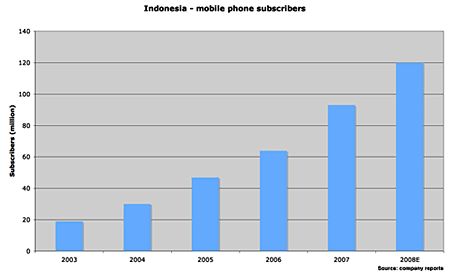
Unsurprisingly, the market is pretty competitive. Ten firms are bidding for customers, using both costlier GSM (for mobiles) and cheaper but more limited CDMA (mostly for fixed wireless). Price wars have got tougher and this will continue for the next couple of years.
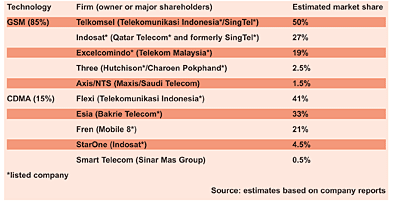
But despite the competition, the sector still looks a compelling investment. Firstly, competition isn't a bad thing in the long run. It will force industry consolidation and probably leave around four large players, who can focus less on cut-throat price wars to win new subscribers and more on boosting profits from encouraging them to use their phones more.
Secondly, it's not as if firms are competing for a tiny pool of subscribers. As you can see below, mobile penetration remains very low in Indonesia, at less than 50%. It will be some time before all these people can afford mobiles, but it will happen as long as the economy continues to grow. In fact, an industry push towards lower prices could be helpful, because lower prices make mobiles affordable for more people.
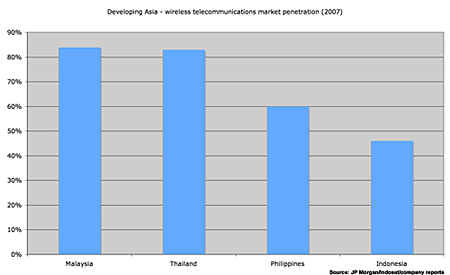
Finally, as incomes rise, people spend more on telecoms, including upgrading to more sophisticated 3G services. Again, this isn't an option for most Indonesians yet 3G amounts to just five million subscribers - but it means that the industry can continue to growing strongly through upgrades, even after every Indonesian has a mobile in their pocket.
Big is beautiful when it comes to telecoms
So what's the best way to get access? For a combination of growth and strength, Telekomunikasi Indonesia is hard to beat. Formerly the state-owned telecoms monopoly (the government still owns 51.2% of the shares), the firm owns 65% of Telkomsel, which has around 50% of the GSM mobile market (Singapore's SingTel owns the other 35%).
Its fixed-line business has more than 90% of the stagnant but profitable fixed-line market, while the Flexi CDMA fixed wireless business is growing well. Its long-term strategy includes developing its 3G network it has around 80% of the 3G market at present and also using its fixed-line business to bring broadband internet to Indonesia. The current broadband market is tiny at just 0.1% of the population, but subscribers are rising fast, as you can see below. This promises to be an excellent business in the long run.
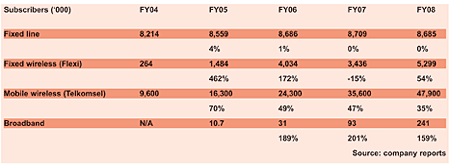
Profits have grown strongly over the last few years, although analysts forecast growth of just 2% this year, due to tougher competition (and that may be optimistic). It's likely that 2009 will be sluggish as well, since competition will continue and the economy will probably slow with the rest of the world.

But there's no doubt that Telekomunikasi is best-placed of all the operators to survive the competition and thrive afterwards. Its debt burden is light for a telecoms firm, with interest-bearing debt to equity of 47% and interest 18 times covered by earnings. Cashflow is also healthy. It was the only one of the five Indonesia-listed operators with positive free cash flow last year. At IDR634/share of free cash flow, it is in a strong position to increase investment if needed or perhaps raise its dividend.
The sell-off means a great buying opportunity
The risks are straightforward. It's possible unlikely, but possible - that Indonesia won't achieve its potential and so the mobile market won't develop as we hope. Alternatively, Telekomunikasi may be out-fought by its rivals; again, this could happen, although as a large experienced operator in a strong financial position, the risk doesn't seem too high.
As a general point, investing in Indonesian stocks can be risky, because of weak corporate governance, poor transparency and corruption; however, Telekomunikasi is a large, widely-owned company with a New York ADR listing (see below).
At its current price, the firm looks excellent value for long-term investors it trades on a forward price/earnings ratio of 10.5 and a dividend yield of 5%. If that looks a suspiciously low price for the key player in such a great growth story, bear in mind that the shares have fallen 44% over the past year.
While some of this must reflect the fears of shorter-term investors about the outlook for the next couple of years, the fact that it's the largest stock on the Indonesian stock exchange and a component of most regional indices means the big withdrawals from Asia-focused funds this year have probably played a bigger part. As you can see in the chart below, Telekomunikasi and the MSCI Asia ex Japan index show a high degree of correlation over the last five years.
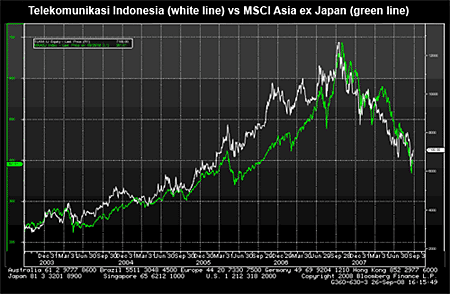
One snag when it comes to investing in markets such as Indonesia is getting hold of the shares. As far as I'm aware, the only UK brokers who will trade Indonesia directly are those catering to clients with very large portfolios. You could open an account with an Asia-based broker such as Kim Eng or Boom, but there is an alternative if you don't want to go down this route.
Telekomunikasi also trades on the New York Stock Exchange as an American Depositary Receipt (ADR). This means that a bank holds Telekomunikasi shares in custody and issues receipts, which give buyer rights over the shares. Those receipts are then listed on a local stock exchange, just like a locally-issued share.
ADRs trade independently of the underlying shares which means they may go at a discount or premium to the share and may not be very liquid. But with a well-known large-cap like Telekomunikasi, this isn't usually too much of a problem. The ADRs and Indonesia-listed shares move together largely in sync; the premium has alternated between 5% and -5% over the past year and at the time trade at a slight discount.
Telekomunikasi Indonesia
Exchange: Indonesia
Ticker: TLKM
Price: IDR 7,100
Market cap: IDR 143,136bn
Telekomunikasi Indonesia ADR (represents 40 regular shares)
Exchange: New York
Ticker: TLK
Price: $29.4
Turning to the markets
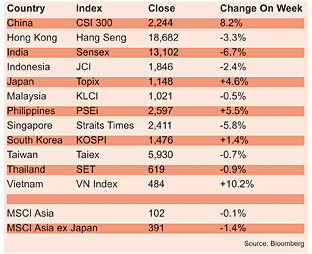
Asian markets were mixed last week, as uncertainty over plans to bail out US banks continued. China has rebounded strongly after dropping below 2,000 two weeks ago; however, the rally is being driven more by optimism over the authorities' efforts to support the market than any change in economic fundamentals.
Banks runs have now spread from the UK and US to Hong Kong. Bank of East Asia, the third-largest bank in the territory, saw depositers queuing outside to withdraw their money - and its shares suffered a beating on the exchange - after rumours about its financial position spread around the territory. The panic stopped after a group of investors headed by Li Ka-Shing, Asia's richest man, bought shares in the bank.
Tighter credit conditions continue to spread eastwards as well. Interbank rates - the rates at which banks lend to each other - have spiked in both Hong Kong and Singapore, with three-month Hong Kong interbank offered rate (HIBOR) and Singapore interbank offered rate (SIBOR) both up 50% over the last two weeks. Higher interbank rates will mean higher rates for borrowers: HSBC, Hong Kong's largest mortgage lender, has already adjusted its mortgage rates in response.
Get the latest financial news, insights and expert analysis from our award-winning MoneyWeek team, to help you understand what really matters when it comes to your finances.

Cris Sholt Heaton is the contributing editor for MoneyWeek.
He is an investment analyst and writer who has been contributing to MoneyWeek since 2006 and was managing editor of the magazine between 2016 and 2018. He is experienced in covering international investing, believing many investors still focus too much on their home markets and that it pays to take advantage of all the opportunities the world offers.
He often writes about Asian equities, international income and global asset allocation.
-
 New PM Sanae Takaichi has a mandate and a plan to boost Japan's economy
New PM Sanae Takaichi has a mandate and a plan to boost Japan's economyOpinion Markets applauded new prime minister Sanae Takaichi’s victory – and Japan's economy and stockmarket have further to climb, says Merryn Somerset Webb
-
 Plan 2 student loans: a tax on aspiration?
Plan 2 student loans: a tax on aspiration?The Plan 2 student loan system is not only unfair, but introduces perverse incentives that act as a brake on growth and productivity. Change is overdue, says Simon Wilson